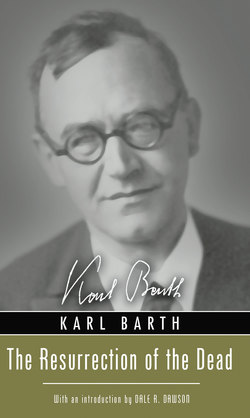Читать книгу The Resurrection of the Dead - Karl Barth - Страница 5
На сайте Литреса книга снята с продажи.
ОглавлениеFOREWORD
THE chapter devoted to the Resurrection of the Dead does not stand in so isolated a relation to the First Epistle to the Corinthians as at first glance might appear. It forms not only the close and crown of the whole Epistle, but also provides the clue to its meaning, from which place light is shed on the whole, and it becomes intelligible, not outwardly, but inwardly, as a unity. We might even say that this central significance of the ideas expressed in the chapter extends beyond the limits of the First Epistle to the Corinthians. Here Paul discloses generally his focus, his background, and his assumptions with a definiteness he but seldom uses elsewhere, and with a particularity which he has not done in his other Epistles as known to us. The Epistles to the Romans, the Philippians, and the Colossians cannot even be understood, unless we keep in mind the sharp accentuation which their contents receive in the light of 1 Cor. 15, where Paul develops what elsewhere he only indicates and outlines, and which first imparts a specific and unmistakable colour to his ideas in general. How vitally important is the chapter, if this be the case, for understanding the testimony of the New Testament generally, I need not emphasize. That it is both right and necessary to subject it to an unusually detailed treatment seems to me to be obvious.
According to the usual conception, 1 Cor. 15 is the last fragment in the great conglomerate of exhortations, rebukes, and doctrinal pronouncements, partly spontaneous, partly prompted by inquiries from the Corinthian community, which, arranged externally according to the needs and inspirations of the moment, constitute together the so-called First Epistle to the Corinthians. After Paul has replied to the manifold questions of the Corinthian community, which provoked his intervention, he comes at length to dwell upon the controversies agitating Corinth with respect to the resurrection, and thus to the resurrection itself. “Without internal or external connexion with what has been said before, the treatment of a new theme then follows” (Lietzmann). Such is the usual interpretation. It has the appearance of being self-evident. The haphazard character of the series of subjects dealt with in 1 Cor. 1–14 is not to be disputed, nor is the lack of connexion by which 1 Cor. 15, with its new theme, is at first joined to this series. But the question arises: first, whether Paul’s reflections upon the subjects dealt with in 1 Cor. 1–14 are as disparate as these subjects themselves, or rather whether a thread cannot be discovered which binds them internally into a whole; and, secondly, whether 1 Cor. 15 is merely to be comprehended as one theme by the side of many others, or rather whether the thread hitherto followed does not at this point become visible, so that this theme, however much externally it is one theme by the side of many others, fails to be recognized at the same time as the Theme of the Epistle. It goes without saying that these questions are of fundamental importance to the interpretation of 1 Cor. 15. If they are to be answered in the affirmative, we have before us in 1 Cor. 1–14, in fact the authentic commentary upon 1 Cor. 15. Consequently, in any attempt to answer them a detailed analysis of 1 Cor. 1–14 is indispensable.
“Though Christ offers us in the Gospel,” says Calvin (Instit. ii. 9, 3), “a present plenitude of spiritual blessings, yet the enjoyment of them always lies hid under the custody of hope till we are divested of our corruptible body and transfigured into the glory of Him who is our first-fruits, our forerunner. In the meantime, the Spirit commands us to rely on the promises. Nor, indeed, have we otherwise any enjoyment of Christ any further than we embrace Him, as He is garbed in His promises. By which it comes to pass that He Himself now dwells in our hearts and yet we live like pilgrims at a distance from Him, because we walk by faith and not by sight.”
JOHN CALVIN.
The translator desires to acknowledge the valuable assistance which the Rev. R. Birch Hoyle has rendered in checking and revising this English version of The Resurrection of the Dead.
